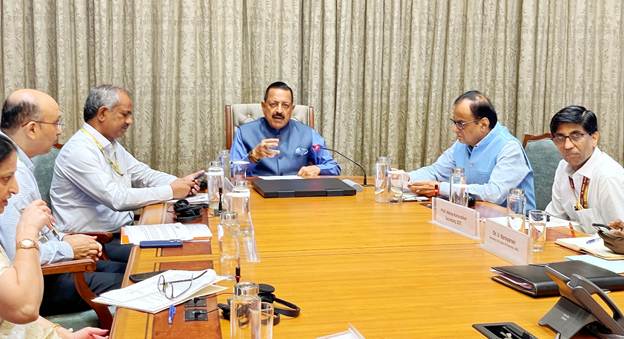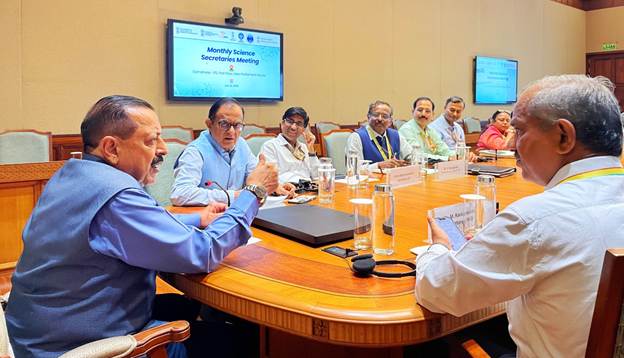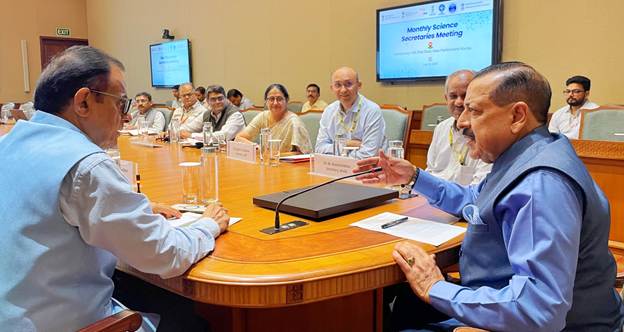Ministry of Science & Technology
India’s BioE3 Policy to Drive Sustainable Biomanufacturing, Dr. Jitendra Singh Tells Joint Review of Science Ministries
Under the policy’s first round of DBT-BIRAC joint calls, over 2,000 proposals received
Space Startups to Take Centre Stage on National Space Day as Govt Pushes for Industry-Led Innovation
The Minister Calls for Unified Scientific Vision Across Ministries
Posted On:
21 JUL 2025 6:52PM by PIB Delhi
The Government’s flagship BioE3 Policy—Biotechnology for Economy, Environment & Employment—took centre stage during a high-level joint review of all Science Ministries chaired by Union Minister of State (Independent Charge) for Science and Technology; Earth Sciences and Minister of State for PMO, Department of Atomic Energy, Department of Space, Personnel, Public Grievances and Pensions, Dr. Jitendra Singh today. The meeting, held here, assessed cross-sectoral scientific initiatives and called for outcome-based coordination across departments in line with India’s Vision 2047 goals.
The BioE3 Policy, approved by the Cabinet in August 2024, aims to position India as a global biomanufacturing hub by integrating biotechnology with artificial intelligence. Dr. Jitendra Singh was briefed on progress under the policy’s first round of DBT-BIRAC joint calls, which received over 2000 proposals. He described the initiative as “a national mission to power green growth, bioeconomic expansion, and employment generation.”
The BioE3 framework focuses on five key domains: Carbon Capture & Utilization, Precision Biotherapeutics, Smart Proteins, Enzymes, and Climate-Resilient Agriculture. About 40% of selected projects are led by startups and industry through PPP models, while academic institutions are driving agri-biotech innovations. Supporting this effort is the national MoolankurBioEnabler Network—a grid of Bio-AI Hubs, biofoundries, and biomanufacturing centres.
Dr. Jitendra Singh also reviewed a proposal to launch 100 post-doctoral fellowships for Indian scientists abroad - a programme which aims to reverse brain drain and build domestic research capacity. “We must offer meaningful opportunities to attract our talent back,” the Minister said.
On the energy front, officials provided updates on site evaluations underway in Bihar for new nuclear power plants. These assessments—covering land, water, seismic safety, and soil viability—are being conducted in consultation with state agencies, with final clearances to come from the Atomic Energy Regulatory Board.
The space sector too featured prominently. A recent breakthrough promises to boost the GSLV Mark-3’s payload by 20% without structural modifications. Officials also cited a near-miss during an international satellite launch, where a crack in a fuel line was swiftly resolved, preventing a potential disaster. Dr. Jitendra Singh commended the swift response and technical preparedness of the teams involved.
The upcoming National Space Day will highlight private sector contributions, with more than 300 startups expected to participate in exhibitions and live demonstrations. “Startups are now integral to our space innovation ecosystem,” an official said, noting that startup-led exhibits will anchor this year’s celebrations.
Educational outreach also drew attention. Science engagement programmes like Vigyan Jyoti have seen increased participation from schoolgirls across the country. With growing demand from younger students—including those in Classes 6 to 10—the Ministry is exploring ways to scale early science mentorship and innovation exposure.
Dr. Jitendra Singh also stressed the need for better inter-ministerial alignment, instructing departments to route key proposals through the Principal Scientific Adviser for strategic prioritisation. “We must avoid overlaps and work in unison to achieve national outcomes,” he said.
As the meeting concluded, the Minister called on Ministries to finalise pending deliverables ahead of the upcoming Parliament session and align projects with long-term scientific goals. “We are not just coordinating programmes—we are laying the foundation of India’s scientific leadership for decades to come,” he said.
The meeting was attended by Principal Scientific Adviser Prof. Ajay Sood; Secretary, Department of Science & Technology, Prof. Abhay Karandikar; Secretary, Department of Biotechnology, Dr. Rajesh S. Gokhale; Secretary, Department of Space and Chairman ISRO, Dr. V. Narayanan; senior officials from all Science Ministries including Department of Atomic Energy.



****
NKR/PSM
(Release ID: 2146530)
Visitor Counter : 554